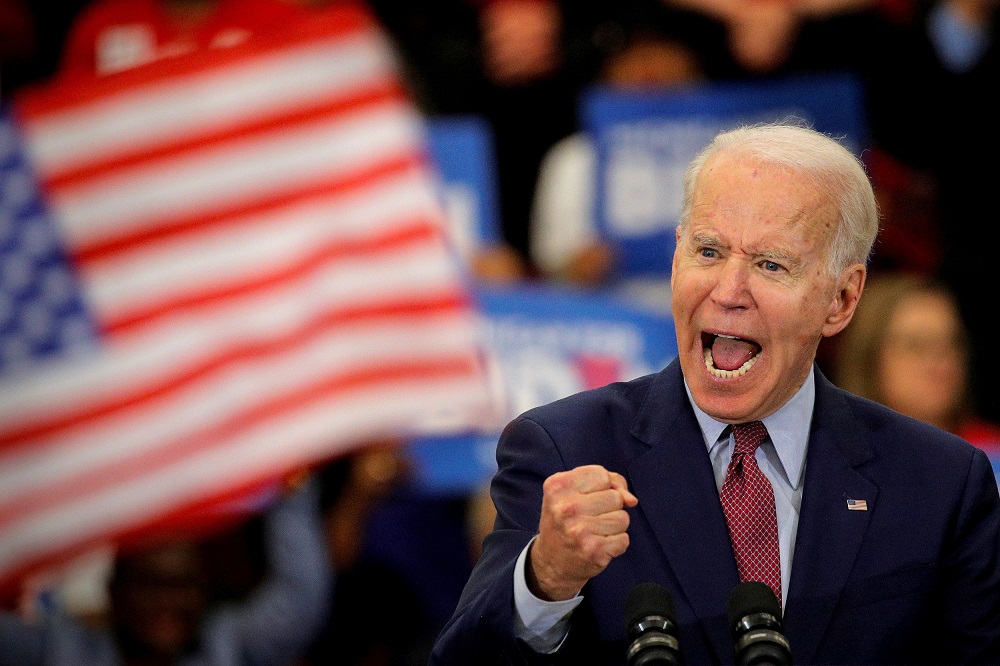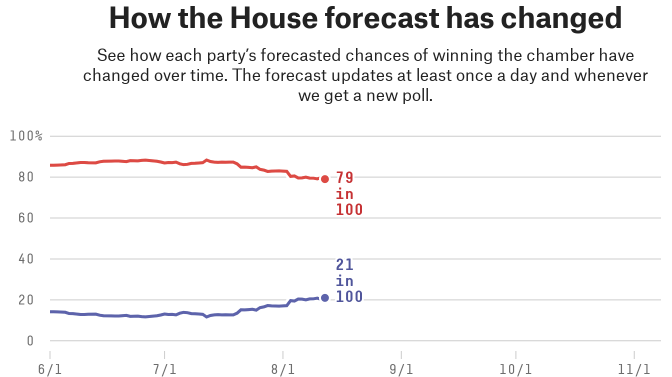Dems in Midterms: You’re Saying There’s a Chance?
A 2020 blowout has long been presumed. But maybe it won't happen.

538 founder Nate Silver wonders, “Will This Be An Asterisk* Election?” (*It takes something unusual for the president’s party to do well in the midterms.)
In 2020, we took pains to emphasize that, although he was a significant underdog in our forecast, former President Donald Trump could absolutely win reelection. Frankly, I’m not sure we’ve taken the same care this year when it comes to Democrats and the U.S. House. Their chances to hold the House started out in the Trump-in-2020 vicinity when we launched our forecast — 13 percent — and now they’ve risen to 20 percent amidst an improving political environment for Democrats.
Looking at the graphic, it doesn’t look all that hopeful:

Still, there’s a decided, if small, trend upward after weeks of little movement.
It’s still not terribly likely Democrats win control of the House. But it also means that a GOP takeover is far from a foregone conclusion. So let’s talk about that 20 percent chance.
Democrats started out with 222 House seats following the 2020 election, four more than the number required for a majority. According to our model, there’s a seven percent chance that Democrats wind up with fewer than 222 seats after November, but still enough seats to maintain a narrow majority. Meanwhile, there’s a 13 percent chance that they actually gain seats.1 Those numbers combined give them their 20 percent chances.
There’s been a lot of good news for Democrats in recent weeks after months of bad news. Overall inflation is still ridiculously high—but gas prices are plummeting. Joe Manchin and Kyrsten Sinema signed on to a massive bill that, while not Build Back Better, is still a significant advance in the Biden/Democratic agenda. Trumper weirdos are beating more viable candidates in primaries. And the January 6 committee is shining the spotlight on GOP crimes at a propitious time.
Then again, all of that’s happening and the polls are only moving incrementally.
Time for a quick historical gut-check. In 19 midterm elections since World War II, the president’s party lost fewer than five seats in the House once, in 1962. And they gained seats twice, in 1998 and 2002. That means three out of 19 times the president’s party would have a successful enough midterm to keep the House, or 16 percent of the time. That squares pretty well with our model’s 20 percent estimate. Of course, the closer we get to the election, the more we can rely on data specific to this year — but it’s good that we’re somewhere in the ballpark.
But what about the exceptions when the president’s party had a good midterm? Did they have anything in common and moreover, is there anything they can tell us about this midterm cycle? Let’s take them one by one.
Democrats’ strong performance in the 1962 midterms under former President John F. Kennedy — they lost only four House seats and gained three Senate seats — is often attributed to the resolution of the Cuban missile crisis, which happened in late October, 1962. The Cuban missile crisis might be overlooked by Americans who came of age after the Cold War, but Kennedy himself thought that there was about a one-in-three chance that it would end in a nuclear war, so its resolution was one of the more pivotal moments of the 20th Century.
There are reasonably clear parallels between 1962 and 2002, when there was a huge rally-around-the-flag effect following the Sept. 11 terrorist attacks, and former President George W. Bush’s Republicans actually increased their House majority.
The 1998 midterm, however, wasn’t precipitated by a threat to American security. Instead, there were special political circumstances: The House launched an impeachment inquiry into then-President Bill Clinton in October 1998 in what would later become the first impeachment trial against a president since 1868.2
And if we go back to midterm elections before the end of WWII, the last time the president’s party gained seats in the House at the midterms was in 1934, in what historians interpret as a show of support for former President Franklin Roosevelt’s New Deal program following the Great Depression.
In short, all these elections featured some sort of special circumstance: the Great Depression, the Cuban missile crisis, the Sept. 11 terrorist attacks and the first impeachment of a president in 130 years. But such a definition is inherently fuzzy as you can potentially retrofit almost any political or news development to constitute a “special circumstance,” in the same way that almost every election gets called “the most important election of our lifetimes.”
Does August 2022 feel like a comparable moment to me? It does not. The closest analog is 1998 and it’s not that close. And, indeed, if anything, it’s Trump who’s under siege. One would hope it would rally fence-sitters to the Democratic side but it could just as easily galvanize Republican turnout.
Take the 2010 midterms, for example. A Democratic president with an ambitious agenda had been elected two years earlier following a global financial crisis. But unlike in 1934, President Barack Obama’s Democrats didn’t gain seats in the House. Instead, they lost 63, the steepest defeat for any party at the midterms since 1938.
So, 2010 was a massive populist revolt. While certainly boosted by Koch funding, there was genuine outrage among the emerging Tea Party right and what would become the Bernie Sanders-Elizabeth Warren left that the response to the greatest economic calamity since the Great Depression was to bail out the very people responsible for the calamity. Plus, it was simply a counter-wave: Democrats won seats that it was next to impossible for them to win on Barack Obama’s coattails and couldn’t hold them.
Or consider the 1990 midterms. President George H.W. Bush was already fairly popular, but there was a further rally-around-the-flag effect following Iraq’s invasion of Kuwait in August 1990, sending his approval ratings into the mid-70s before they slipped back into the 50s by November. Still, that might seem to qualify as a special circumstance. Yet, Bush’s Republicans lost seats in the House. Then again, they lost fewer seats than usual (eight seats) along with just one Senate seat, so maybe that counts as a partial validation of our theory.
Sigh. So, what you’re saying, Nate, is that we don’t really have a theory so much as a catch-all explanation for elections that don’t follow the general trend?
In any event, if Democrats do keep the House, I don’t think historians will have any trouble giving 2022 the special-circumstances asterisk, like they do now for 1998 and 2002.
As I said.
But what is the special circumstance?
It might be noted that the 2022 election is taking place amidst the still-ongoing COVID-19 pandemic, unquestionably one of the most important events in every American’s lifetime given the widespread death and disruption to daily life. With that said, most people have stopped caring about COVID-19; only 1 percent of Americans regarded it as the most important issue facing the country when Gallup asked about it in June. Perhaps if the delta and omicron variants had never come along, Democrats could have campaigned on some miraculous return to normal. Instead, the return has been bumpy, epidemiologically, economically and otherwise. So that’s not the special circumstance I’m referring to, although the pandemic may have hard-to-measure knock-off effects on politics and society.
Nor is the special circumstance an international or security crisis, although there are some conflicts that could boil over by November — that’s part of the intrinsic uncertainty in an election forecast. Russia’s invasion of Ukraine isn’t having any obvious effect on the U.S. midterms for now, but if there were nuclear weapons used or any direct American or NATO military engagement, that could change. Meanwhile, Chinese-U.S. tensions over Taiwan are also rising following House Speaker Nancy Pelosi’s visit there.
So, here’s the thing. Those things could absolutely happen and they might well influence the outcome of the election. But, goddamn it Nate, they aren’t factored into the 20% figure in the current forecast. Right?
Instead, I’m keeping my eye on the potential for a special political circumstance, more like what we saw in 1998, when the public responded to increasing Republican partisanship and their efforts to impeach Clinton.
Republicans swept to power in Congress in 1994 on an unusually substantive platform including the “Contract with America,” and even achieved a number of policy successes with the centrist, triangulating Clinton. So for them to turn around and make the 1998 midterms about Clinton’s personal conduct was probably a mistake. Although the Monica Lewinsky scandal seems almost quaint by current standards, the impeachment trial and other investigations into Clinton reflected a significant escalation of partisanship under then-House Speaker Newt Gingrich, one that has continued through today.
But what would that even look like? Republicans have certainly been hyper-partisan but they’re in the minority and thus don’t have the power to do something like that.
Of course, partisanship alone doesn’t guarantee an electoral backlash. Near-universal Republican opposition to Obama’s agenda didn’t hurt them at all in the midterms in 2010. Instead, what differentiated 1998 is that Republicans were on the attack and not merely trying to block Democrats from getting their own agenda implemented. Relative to the standards of 1998, impeachment was a dramatic step and one that allowed Clinton to gain significant public sympathy.
This time, Republicans are exercising power not through the Congress but through the courts: most importantly, through the decision by a 6-3 majority of Republican-appointed judges on the Supreme Court to overturn Roe v. Wade.
Immediately after the court overturned Roe, Democrats began to gain ground on the generic congressional ballot, which asks voters which party they’d support in an election, and it’s now translated into some electoral successes, too. In Kansas last week, voters overwhelmingly rejected a ballot initiative that would have allowed the legislature to restrict abortion in the state amid very high turnout. And in Minnesota this week, Republicans won a special election in the 1st Congressional District by only 4 percentage points, a district that Trump won by 10 points in 2020. Likewise, on June 28, just a few days after Roe was overturned, Republicans won a special election in Nebraska’s 1st District by only 5 points in a district that Trump carried by 15 points.
So . . . this is quite plausible. And, unlike international crises that may or may not emerge, is already reflected in current polling. But, again, the ruling has already happened and should be baked in.
It’s not just the courts, either. Republicans are also aggressively exercising power through state governments, especially on abortion, gay and transgender rights and education policy. And although voters don’t regard Jan. 6 as an event as important as Sept. 11 — public opinion about it is also much more polarized — it’s a reminder that Republicans can also potentially seek to achieve power through extralegal means.
If nothing else, Democratic voters have no shortage of motivation to turn out: Many feel as though their basic rights are being threatened, something a party’s voters ordinarily aren’t concerned about when it controls both the presidency and Congress. The “enthusiasm gap” often accounts for much of the presidential party’s disadvantage at the midterms, but it’s not clear it exists this year after Roe was overturned.
I think that’s right. Again, though, this is baked into the current numbers. I suppose it’s possible that, as more Republican legislatures do more of this stuff, a greater backlash occurs. Especially if it happens in purple states here Republicans have relatively narrow control.
All that said, Republicans are still fairly clear favorites to keep the House. Notably, President Biden is quite unpopular despite a modest improvement in his approval ratings, whereas FDR, JFK, Clinton and GWB were all popular at the times of their midterms. The public still has very negative views about the economy and the direction the country is headed in, and that’s usually rough for the party in power to overcome.
Yup.
But the circumstances of these midterms are also potentially unusual, with high uncertainty, and that’s why Democrats keeping the House is a thinkable outcome.
Goddamn it, Nate. All elections feature circumstances that are unusual! All of them! As you’ve already demonstrated, the ones that defy the general trend in which the President’s party loses seats during the midterms are more than “unusual”—they feature something that’s essentially historic in scale. Something like that could absolutely arise. But, again, the point of the article was supposed to be to explain the 20 percent chance in the existing model.





Don’t presume the impact of striking Roe is “baked in”, James. The magic sauce of those polls is the weighting which could be off due to typical non-voters turning out due to their rights feeling threatened.
If 2022 Is a ‘Normal’ Midterm by One Metric, Democrats Will Actually Gain Seats in the House
It’s too wonky for me to dive into on a Saturday morning, but he does have a sense of humor.
@SKI: It’s certainly a possibility. Support for the GOP should be at something like 33% right now—which is what I consider the hard floor. That is so much higher than that confounds me. But it is what it is.
Not a word about the FBI search based on probable cause that serious infractions have occurred in the handling of highly classified documents. Or that a former president just took the Fifth over 400 times in a civil trial, in which hardly anyone ever takes the Fifth. Esoteric specialist concerns, nothing to see here. And oh yes, all that will raise Trump support like nobody has ever seen before.
Lol, Nate gives away the game there. Republicans have been in charge forever and ever, world without end amen.
Extrapolating from “normal” times seems particularly foolish this year, but it’s easier than believing things might change.
I feel the same way about this year’s election prognostication as I’ve felt about recent economic data: things are weird and there are too many atypical variables for anyone to feel comfortable about their guesswork.
Nice Dumb & Dumber reference though! 😀
My inner smart recreational gambler reminds me the questions really is “Do Democrats have a good chance of keeping the House?”
As, technically, one chance in a trillion trillion is still a chance.
@Kathy: I think that’s the joke.
@Cheryl Rofer:
Things could certainly change, but there doesn’t seem to be much evidence that it will which is why the probabilities are what they are. Structural issues, the binary nature of our political choices, the unpopularity of Pres. Biden, and negative partisanship are powerful forces that counteract Republican mistakes and unpopularity.
I skimmed the Silver piece the other day, and I can’t remember if he dealt with the following fact or not: the lack of competitive seats focuses the entire discussion on a relative handful of seats.
Surely the model takes that into account. But I always find it annoying when broader discussions of potential outcomes don’t face the issue directly.
But it also means that a lot of the national trends under discussion are less likely to move the needle than Silver punditry suggests, IMO. I appreciate Silver’s work, but it seems that he has been more pundit-y of late (which is not a good thing). Maybe it is because he has been spending so much time in Vegas gambling as research for his book.
I will also note that I have less confidence in the congressional models than I do in the presidential ones.
The Kansas abortion vote surprised everyone. And it was in Kansas.
I have no idea whether this will translate into support for candidates or not, and what the voter pool will look like. And I’m wary of anyone who claims to know.
Biden is unpopular, but a lot of that is his base being unhappy with him. His base is also really pissed at Republicans, and motivated to turn out.
It’s worth looking at the direction of the movement in Nate’s polls. A couple weeks ago Biden was -20 net. Now he’s -16. The Senate polling has swung pretty dramatically. The House polling not so much, but even there the movement is all in one direction.
The January 6 committee returns in September.
We may learn some impossible-to-spin things about Trump.
Gas prices are coming down.
Stocks are up.
Unemployment barely exists.
Biden has smacked Putin and ignored Xi.
Kansas.
It ain’t over til the votes are counted. Then challenged. Then subjected to scurrilous lies.
Well, my most important take is that I’ve rolled a lot of dice in my time, and 20 percent chances aren’t to be ignored. Which is pretty much what Nate says, both up front and in the last quote you pulled.
Hindsight bias is such that, should the Dems hold the House, we will have all sorts of narrative explanations for it. Maybe that’s a good way of thinking of it, but maybe it isn’t. Maybe elections turn on things like who got distracted and didn’t vote because their kid was sick or they had a flat tire, or stuff like that.
Best bet for the Democrats is that they hold onto the Senate. I can’t see how they hold onto the House. At the same time, the GOP has gone all-in on the things that are just horrendously unpopular and it might be that they are imploding in the face of actual humans who are not total losers. The land of the walking dead might have its limits.
I mean, I don’t watch any news on television, and I guess I must never have heard DeSantis speak until several days ago. But my god, it was hilarious–no wonder he’s such a pathetic scumbag: that nasal voice and dickless little car salesman facade and tightly-wound emasculation all poised to go after trans people. That man has as much chance as me as being President. I don’t care what the polls say. Trump will eat him alive, even (or especially) if he’s in federal prison.
@MR yesterday:.. Here’s my admittedly fiction writer guess: the FBI’s known for a long time what Trump had, they were waiting to see one of his documents shopped.
@MR today:..We may learn some impossible-to-spin things about Trump.
I liked your fiction take yesterday. Care to look deeper into your crystal ball?
Kansas looks very canary-in-a-coal-mine esque. Republicans had better hope pollsters elsewhere aren’t as off on electorate composition. The pundit class should hope they aren’t as off about voter priorities.
We were assured “The Kansas abortion vote will be close.” Not so much. Some pundits were all in on “Nancy Pelosi is an electoral liability for Democrats running in 2018.” Oops.
“Forced birth horror stories won’t move the 2022 midterm needle much.” Okay. But I wouldn’t bet on it.
Wait…. I thought the mid-term elections were hanging on poor Democratic messaging.
But now the progressives are singing kumbaya with Joe Manchin, while Rand Paul is suggesting the FBI is planting evidence to incriminate Trump and MTG wants to impeach Merrick Garland.
The Democrats should win in a walk then… right? Right?
I’m really curious to see how the primary between Liz and Harriet turns out this next week. Mostly to see just how close it is, I’m expecting Hageman to win, but I would not be surprised if it’s NOT the total blowout all the polls are predicting.
@DK: As much as I hate raining on anyone’s parade, I really wonder how many needle-moving forced birth stories there can be in the next 2 months. Additionally, I wonder if forced-birth narratives will really trigger voter attitude change and to what degree. Still, you can always move to the ever-popular “We don’t need to move the needle very far; we only need a few.”
ETA: Meanwhile my R +20 district just traded a good at constituent service Republican representative for a “Murka First” replacement, but I don’t predict that will help the Democrat win. (And the new guy isn’t about abortion at all, he’s concentrating on privatizing Social Security and cutting block grants for police.)
@Mister Bluster:
Well, dude, I tend to over-plot things. From creating backstories for random people I see in a passing car, to seeing foreshadowing in every event (‘Bye, babe!’ And that was the last time he saw her before…), to just sitting around inventing story ideas I don’t have the time or energy to write, there’s this part of my brain that just spits out story. It’s really quite irritating and often exhausting. There’s a reason I smoke pot and drink whiskey.
In any event, if I were writing the Merrick Garland story I’d have him with a pretty good idea of what documents Trump had. And I’d wait til I saw evidence of that document or its contents showing up in Riyadh or Moscow. Then I’d serve the search warrant to confirm that Trump was in fact in possession. Then I’d take a good long look at the Saudi gift of 2 billion to Jared. Motive is easy. Means? He had secret docs worth money. Opportunity? Did Trump or anyone in his circle have the opportunity to transmit secret information? In the digital age of course they did, all they’d have needed is a Telegram account.
That’s how I’d write it. But I’d need the Mar-a-Lago rat and I’d be hoping it was a reasonably attractive female who could be played by Zendaya. I’ll need a sexy subplot of course, some betrayal, some emotionally-charged stuff. Someone’s going to have to have a kid with cancer and at least one character will need to have a drinking problem.
@Michael Reynolds:..mar a lago rat (Peter Lorre?)…
I can’t respond now. Thank’s for the reply.
@Just nutha ignint cracker:
I’ll just stick with the once popular “The Kansas abortion vote is going to be really close and polls show yes winning, because Kansas is a deep red state and Dobbs is not going to trigger big enough motivational backlash to overcome Kansas’s conservatism.”